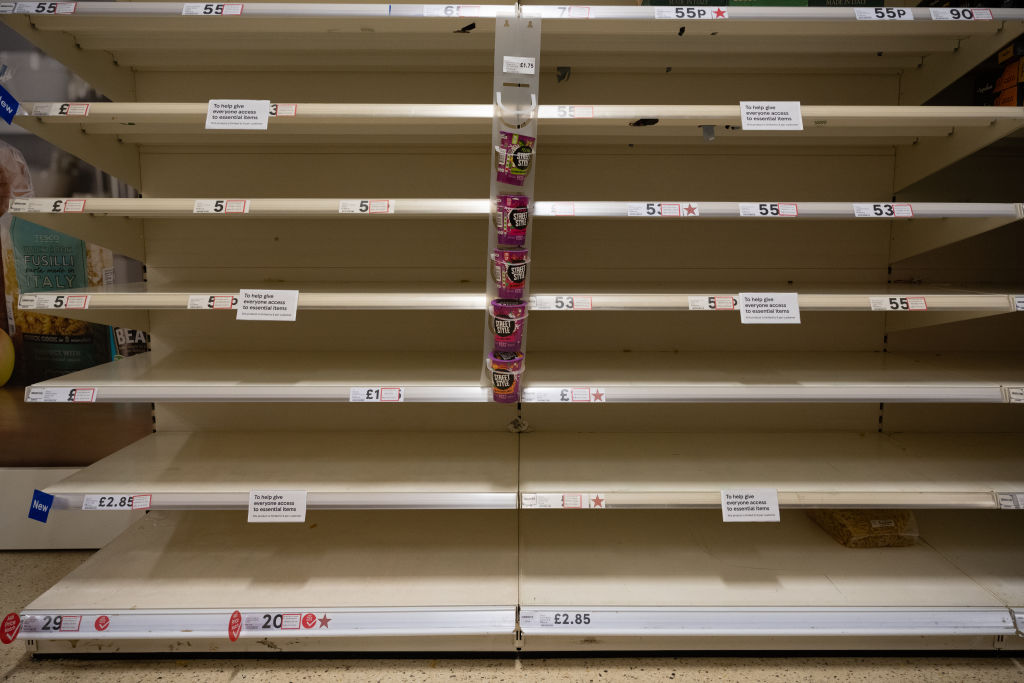The U.K. government has advised anyone with a cough or fever to self-isolate for seven days, as the country grapples with the outbreak of the new coronavirus. At a press conference on Thursday, Prime Minister Boris Johnson said that the newly-classified pandemic was “the worst public health crisis for a generation” and warned that many families would “lose loved ones before their time.” COVID-19, the disease caused by the virus, has killed more than 4,700 people and sickened more than 128,000 globally.Here’s what to know about the situation in the U.K., and how the government is responding to the outbreak.
How many COVID-19 cases does the U.K. have now?
According to the BBC as of Friday morning, there have been 596 confirmed cases of the disease in the U.K. and 10 deaths. The majority of cases have been in England, although Wales, Scotland and Northern Ireland have all confirmed multiple cases.
The first cases in the U.K. were confirmed at the end of January. They were reported in the northern city of York, where two Chinese nationals tested positive for the coronavirus on January 29. On March 5, a woman with underlying health conditions became the first person in the U.K. to die from the disease after testing positive for the coronavirus.
Where in the U.K. has the most cases?
Government figures suggest that London has the highest number of confirmed cases in England, at 136 as of March 13. The city’s financial hub in Canary Wharf was affected last week, as HSBC evacuated a floor of its office tower after an employee tested positive for the virus. Hertfordshire, Devon and Hampshire also have high concentrations of confirmed cases.
Keep up to date with our daily coronavirus newsletter by clicking here.
How bad could the U.K.’s coronavirus outbreak get?
As data is still emerging about this new disease, it’s unclear exactly what the impact will be. According to the government’s coronavirus action plan, “in a stretching scenario, it is possible that up to one-fifth of employees may be absent from work during peak weeks.” The government also said it is more likely than not that the U.K. will be significantly affected, as current data indicates that everyone is susceptible to catching the disease.
Professor Francois Balloux, of the University College London Genetics Institute, said on March 10 that the progress of COVID-19 in the U.K. is “so far roughly comparable to the one in northern Italy, but with the epidemic in northern Italy two to three weeks ahead of the situation in the U.K.” On Monday, Italy placed its 60 million residents under lockdown as the number of confirmed cases of coronavirus rose to the highest number of cases and deaths outside of China.

How is the U.K. government preparing?
The U.K. government’s focus has moved on from containing to delaying the spread of the virus. This involves tracing people who had contact with those diagnosed with COVID-19 and getting them to self-isolate. The BBC reports there are 30 hospitals on stand-by to take patients, and the rest of the NHS has been put on emergency footing. All patients who have flu-like symptoms are now being tested. Last week, a survey found that more than 99% of medics thought that the NHS was not well prepared for the coronavirus outbreak. On Thursday, people with symptoms were advised not to call the NHS helpline as the system is under significant strain.
A range of other measures, including school closures, restrictions on public transport, stopping big gatherings and using new legal powers to make people stay in quarantine are at the government’s disposal, but these measures have not been taken so far. England’s deputy chief medical officer said that cancelling big outdoor events would not be a decision supported by science. While Dr Jenny Harries said that the virus will not survive long outside and that outdoor events are “relatively safe,” a recent editorial in The Lancet medical journal noted that the situation in China indicates “that quarantine, social distancing and isolation of infected populations can contain the epidemic.”
At a press conference on Monday, Boris Johnson was asked why he hasn’t followed the lead of other European countries by banning mass gatherings and closing schools. “What’s happening in other countries doesn’t necessarily mirror what’s happening here in the U.K. and that is why we’re following the scientific evidence in the way that we are,” the Prime Minister said. While schools have been closed in other European countries including Ireland, Italy, Norway and Poland, the U.K. government says experts believe this would not work in practice as children may end up socializing with each other or with their grandparents, who would be more vulnerable to the coronavirus. Health Secretary Matt Hancock said closing schools would be ineffective and disruptive.
Johnson suggested that elderly and vulnerable people could be asked to stay at home in the near future as the government tries to delay the peak of the outbreak to the summer, when the NHS will be better able to manage. Johnson reiterated this message on Thursday, saying that it was important to get the timing right for stricter measures. Meanwhile, Scotland’s First Minister Nicola Sturgeon said that from March 16, gatherings of more than 500 people in the region would be canceled to reduce pressure on frontline services.
Lawmaker and health minister Nadine Dorries tested positive on March 10, and had met hundreds of people since first reporting feeling unwell on March 6. Johnson’s team of advisers said there was no need to test the Prime Minister for the coronavirus, as he had not been in close contact with Dorries and regularly washes his hands, Bloomberg reports. Johnson’s government is reportedly working with a behavioral psychology team to emphasize hand-washing among the British population. So far, Johnson’s response to the virus has been criticized for being more relaxed compared to efforts around the world, including in other parts of Europe.
How could the coronavirus outbreak disrupt daily life in Britain?
The British Medical Association said that primary care physicians (widely called GPs in the U.K.) may have to stop carrying out routine health checks, assessing blood pressure, diabetic control and monitoring long term heart and lung disease, in order to “focus on the sickest patients” amid the outbreak. Dr Richard Vautrey, chair of the BMA’s GP committee, told the BBC that patients with mild health complaints should expect to wait longer to see their GP, and that cases of coronavirus were expected to “rise rapidly and over the coming weeks.”
Some universities in the U.K. announced they would be canceling classroom lessons and teaching courses online, and British soccer matches have been suspended until April 3 after Premier League bosses met Friday morning. Reports suggest consumers are panic buying and emptying shelves of everyday items including toilet roll and hand sanitizer amid the outbreak. Some shops have introduced sales restrictions on certain items, including pasta and tinned vegetables.

How could COVID-19 affect the U.K.’s economy post-Brexit?
Amid the outbreak on March 11, the Bank of England cut U.K. interest rates to the lowest level in the Bank’s 325-year history, from 0.75% to 0.25%. Mark Carney, the outgoing governor of the Bank of England, said that economic damage caused by COVID-19 was as yet unclear, but suggested that the U.K. economy could shrink in the coming months. The U.K. economy failed to grow in January even before the growth of the outbreak in Europe, adding to the case for the emergency cut.
The same day, Chancellor Rishi Sunak delivered the 2020 U.K. budget, opening by saying he expects the coronavirus to have a “significant impact” on the U.K. economy. Sunak also said that the government will give the National Health Service “whatever extra resources our NHS needs to cope with COVID-19,” will also introduce a loan scheme to support small and medium sized businesses, and will extend sick pay for some workers. Overall, he announced a £30 billion ($39 billion) stimulus to support the economy through the outbreak.
Please send any tips, leads, and stories to virus@time.com.
More Must-Reads from TIME
- Donald Trump Is TIME's 2024 Person of the Year
- Why We Chose Trump as Person of the Year
- Is Intermittent Fasting Good or Bad for You?
- The 100 Must-Read Books of 2024
- The 20 Best Christmas TV Episodes
- Column: If Optimism Feels Ridiculous Now, Try Hope
- The Future of Climate Action Is Trade Policy
- Merle Bombardieri Is Helping People Make the Baby Decision
Contact us at letters@time.com